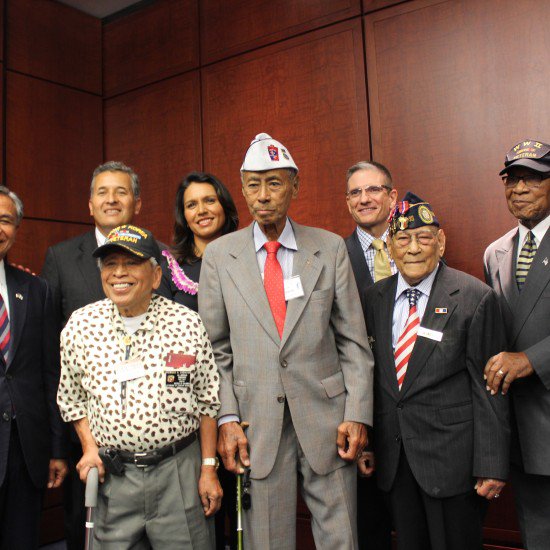Washington, D.C. The U.S. Senate today approved by unanimous consent S. 1555, the Filipino Veterans of World War II Congressional Gold Medal (CGM) Act of 2015, a measure that would grant national recognition to the more than 260,000 Filipino and American soldiers who served under the United States Army Forces in the Far East (USAFFE).
Introduced in June last year by U.S. Sen. Mazie Hirono (D-HI), with U.S. Senator Dean Heller (D-NV) as lead co-sponsor, the bill gained bipartisan co-sponsorship of 72 U.S. Senators – a super majority that demonstrates the support needed to merit moving the bill in an expedited manner. Minority Leader Harry Reid (D-NV) and Senator Tim Kaine (D-VA) also played key roles in moving S. 1555 this far.
“Our veterans and their families have been waiting for this awesome news,” says Maj. Gen. Antonio Taguba (Ret), chair of the Filipino Veterans Recognition and Education Project (FilVetREP). “They will be very pleased and proud to know that the U.S. has not forgotten their wartime service to this country. We call on the U.S. House of Representatives to follow the Senate’s lead and finally make this long-awaited recognition a reality for our soldiers who performed their duty with honor and uncommon valor.”
To date, the House companion bill, HR 2737, which was also introduced in June last year by U.S. Rep. Tulsi Gabbard (D-HI-2), with U.S. Rep. Joseph Heck (R-NV-3) as lead co-sponsors, currently has 168 co-sponsors. It is expected, however, that today’s Senate’s action will help build momentum to gather more bipartisan support in the House.
“We are extremely grateful to Sen. Hirono and Sen. Heller for their personal commitment and determination to push this bill through,” says Marie Blanco, FilVetREP Vice Chair. “They championed this very important legislation because they appreciate the urgency of getting it passed this year.”
Blanco also thanked the Senate Banking Committee, which has jurisdiction over CGM legislation, for “giving the green light to pass this bill by unanimous consent. We are appreciative as well of U.S. Senate Majority Leader Mitch McConnell (R-KY), U.S, Senate Minority Leader Harry Reid (D-NV) and U.S. Sen. Tim Kaine (D-VA) for their leadership in promptly facilitating the approval process.”
Informed of this Senate action, 85-year-old Rudy Panaglima, a Filipino World War II veteran of Arlington, Va. welcomed the news with a sense of joy and relief. “My comrades and I have been waiting for more than 70 years, so I am delighted that we will finally be recognized,” he said. “I can only say ‘God bless America’ for doing the right thing.”
Panaglima is among 15,000 surviving veterans residing in the U.S. and the Philippines. Most of them are in their mid 90’s. They served in the USAFFE as Philippine Scouts, members of the Philippine Commonwealth Army and Recognized Guerillas.
The Congressional Gold Medal (CGM) is the highest award bestowed by U.S. Congress to an individual or group who performed a significant achievement that has impact in American history and culture.
Learn more about the Filipino Veterans Recognition and Education Project here.




